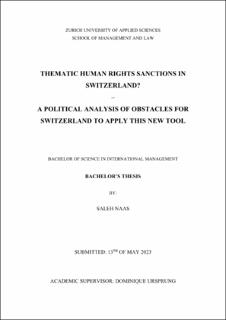Please use this identifier to cite or link to this item:
https://doi.org/10.21256/zhaw-31111Full metadata record
| DC Field | Value | Language |
|---|---|---|
| dc.contributor.advisor | Ursprung, Dominique | - |
| dc.contributor.author | Naas, Saleh | - |
| dc.date.accessioned | 2024-07-12T17:13:31Z | - |
| dc.date.available | 2024-07-12T17:13:31Z | - |
| dc.date.issued | 2023 | - |
| dc.identifier.uri | https://digitalcollection.zhaw.ch/handle/11475/31111 | - |
| dc.description.abstract | Switzerland’s main democratic international partners are applying thematic sanctions, which are motivated by a specific issue, such as human rights, rather than by events, as in comprehensive and targeted sanctions. Switzerland is not doing so. It is a constitutional duty of Switzerland to “promote the respect for human rights abroad”. Therefore, this thesis aimed to unfold findings relevant to evaluate whether Switzerland is acting on a constitutional duty sufficiently. Moreover, Switzerland’s current approach to sanctions was criticized by parliamentarians, foreign governments, as well as local and international media, and has caused protests. Therefore, this thesis had the objective to provide answers by helping the reader comprehend Switzerland’s reluctance to apply thematic human rights sanctions. The thesis aimed to approach the knowledge gap by identifying the obstacles which stand in the way of a Swiss application. The results of this thesis are based on qualitative research. The findings were mainly retrieved from the analysis of parliamentary activity, interviews that have been conducted with four members of Parliament and a representative of the State Secretariate of Economic Affairs (SECO), as well as information from relevant publications. It was found that the Swiss government is facing pressure, mainly in the form of parliamentary activity, lobbyism, and diplomatic interventions, to adopt thematic human rights sanctions, and to a lesser degree, not to adopt them. This thesis has shown that Switzerland would face no legal obstacles to adopt such sanctions from the EU and that adoption would be in line with its Constitution and the described purpose of sanctions in Swiss law. If Switzerland were to impose its own sanctions, independent from the EU, there would be obstacles in terms of achieving the majorities for the needed revision of the law. However, this thesis suggests that it would likely be more of a service to human rights if Switzerland were to adopt the EU sanctions rather than imposing its own, as it was found that a coordinated approach is more effective. It was found that the argumentation of the Swiss government regarding the adoption of sanctions lacks coherence and is hardly comprehensible. This thesis argues that the reasoning of the Swiss government is not fact-based and has proven that the credibility of the Council’s arguments can be questioned. Consequently, this thesis argues that there is a need to establish a fact-based and transparent sanctions adoption evaluation process, which is in line with Switzerland’s values, Constitution, and law, to ensure that such decisions are accepted by the public, the Parliament, and Switzerland’s international partners. Moreover, it was found that the sanctions department at SECO is facing operational difficulties, which could negatively impact the effectiveness of sanctions. Therefore, this thesis concludes that Switzerland would need to overcome political obstacles to adopt the thematic human rights sanctions from the EU, and operational obstacles to ensure that they would have an impact beyond their symbolic value. | de_CH |
| dc.format.extent | 56 | de_CH |
| dc.language.iso | en | de_CH |
| dc.publisher | ZHAW Zürcher Hochschule für Angewandte Wissenschaften | de_CH |
| dc.rights | https://creativecommons.org/licenses/by-nc-nd/4.0/ | de_CH |
| dc.subject.ddc | 327: Internationale Beziehungen | de_CH |
| dc.title | Thematic human rights sanctions in Switzerland? : a political analysis of obstacles for Switzerland and to apply this new tool | de_CH |
| dc.type | Thesis: Bachelor | de_CH |
| dcterms.type | Text | de_CH |
| zhaw.departement | School of Management and Law | de_CH |
| zhaw.publisher.place | Winterthur | de_CH |
| dc.identifier.doi | 10.21256/zhaw-31111 | - |
| zhaw.originated.zhaw | Yes | de_CH |
| Appears in collections: | BSc International Management | |
Files in This Item:
| File | Description | Size | Format | |
|---|---|---|---|---|
| 2023_Naas_Saleh_BSc_IM_V2.pdf | 381.66 kB | Adobe PDF |  View/Open |
Show simple item record
Naas, S. (2023). Thematic human rights sanctions in Switzerland? : a political analysis of obstacles for Switzerland and to apply this new tool [Bachelor’s thesis, ZHAW Zürcher Hochschule für Angewandte Wissenschaften]. https://doi.org/10.21256/zhaw-31111
Naas, S. (2023) Thematic human rights sanctions in Switzerland? : a political analysis of obstacles for Switzerland and to apply this new tool. Bachelor’s thesis. ZHAW Zürcher Hochschule für Angewandte Wissenschaften. Available at: https://doi.org/10.21256/zhaw-31111.
S. Naas, “Thematic human rights sanctions in Switzerland? : a political analysis of obstacles for Switzerland and to apply this new tool,” Bachelor’s thesis, ZHAW Zürcher Hochschule für Angewandte Wissenschaften, Winterthur, 2023. doi: 10.21256/zhaw-31111.
NAAS, Saleh, 2023. Thematic human rights sanctions in Switzerland? : a political analysis of obstacles for Switzerland and to apply this new tool. Bachelor’s thesis. Winterthur: ZHAW Zürcher Hochschule für Angewandte Wissenschaften
Naas, Saleh. 2023. “Thematic Human Rights Sanctions in Switzerland? : A Political Analysis of Obstacles for Switzerland and to Apply This New Tool.” Bachelor’s thesis, Winterthur: ZHAW Zürcher Hochschule für Angewandte Wissenschaften. https://doi.org/10.21256/zhaw-31111.
Naas, Saleh. Thematic Human Rights Sanctions in Switzerland? : A Political Analysis of Obstacles for Switzerland and to Apply This New Tool. ZHAW Zürcher Hochschule für Angewandte Wissenschaften, 2023, https://doi.org/10.21256/zhaw-31111.
Items in DSpace are protected by copyright, with all rights reserved, unless otherwise indicated.